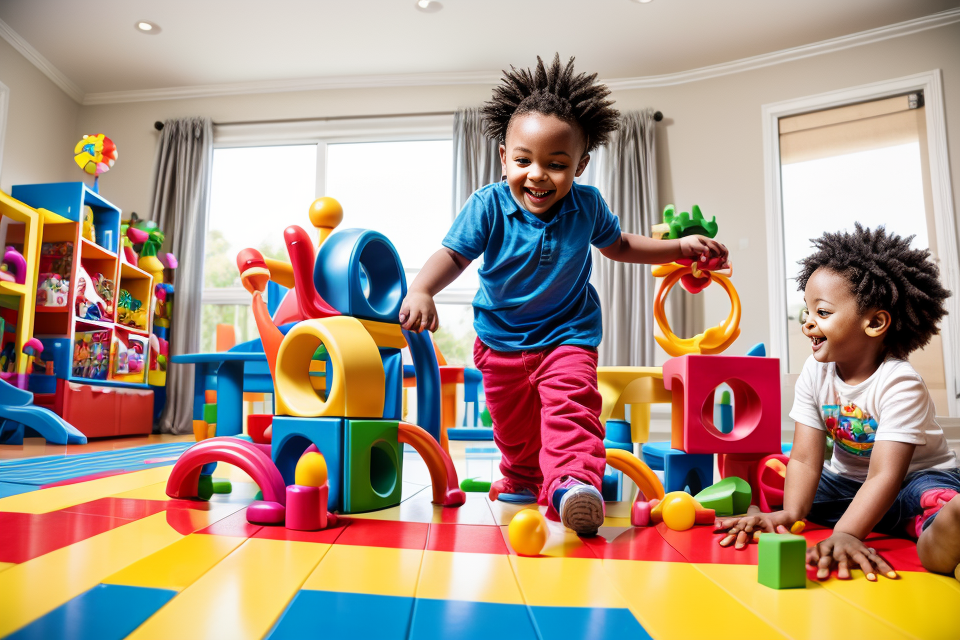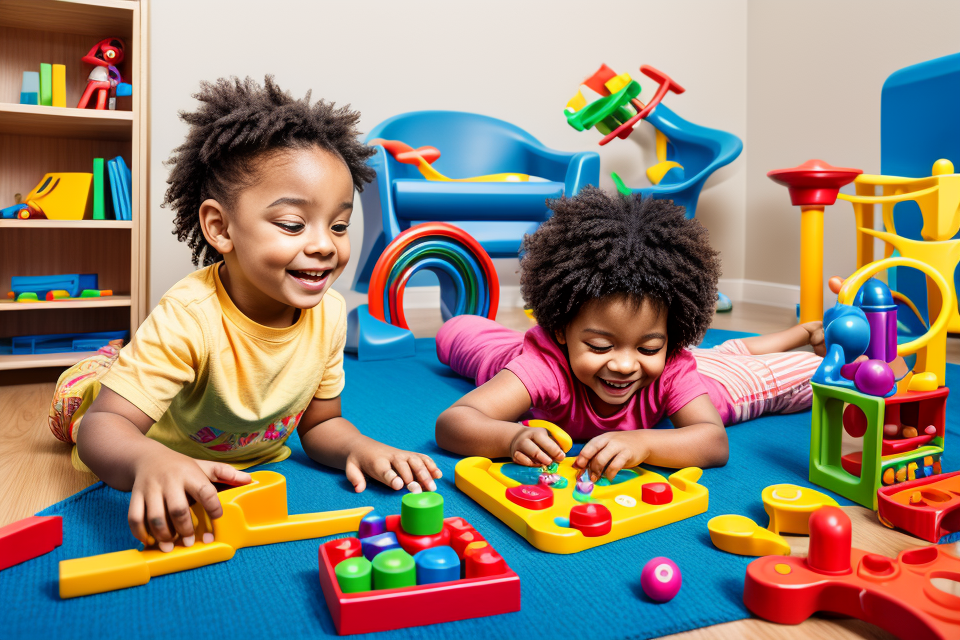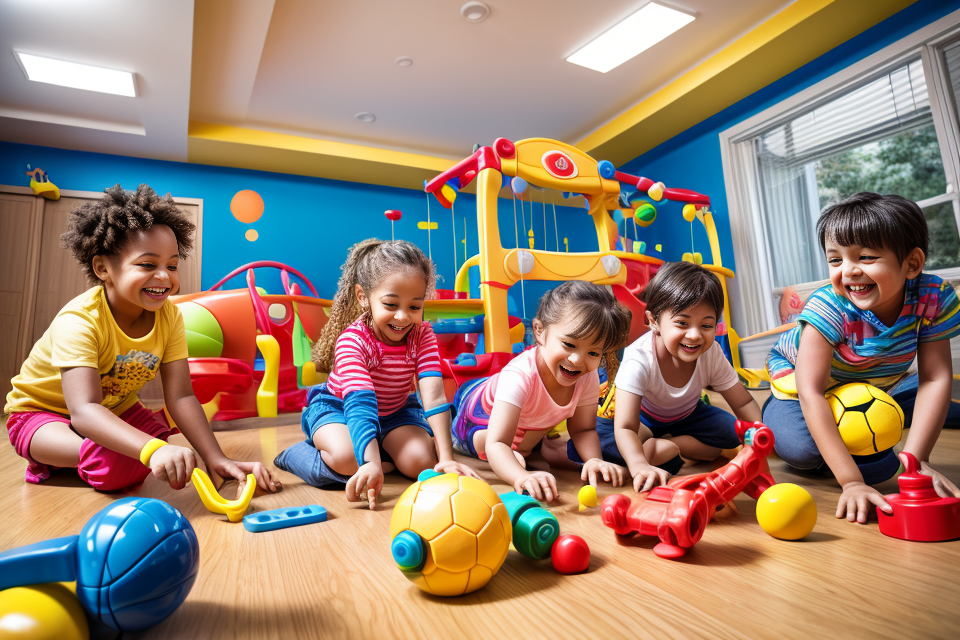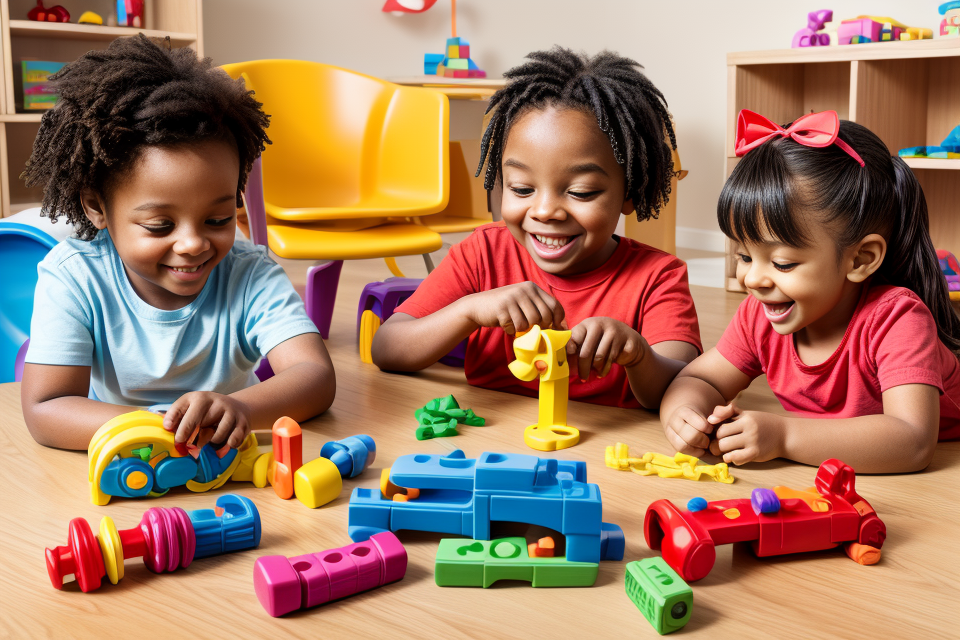Are you ready to unleash the power of playtime? Get ready to be amazed by the surprising benefits of playing with toys! Not only is it a fun and engaging way to spend your time, but it also has a positive impact on your overall development. From enhancing creativity to improving problem-solving skills, playing with toys offers a wealth of interactive learning opportunities. So, let’s dive in and discover the top 5 benefits of playing with toys!
The Importance of Playing with Toys
Encouraging Imagination and Creativity
Playing with toys has been a vital part of childhood for centuries. Toys have been used as tools to help children learn, explore, and express themselves. One of the most significant benefits of playing with toys is that it encourages imagination and creativity in children.
Imagination is the ability to form mental images or concepts of things that are not present. It is an essential part of cognitive development in children. Playing with toys can stimulate imagination by providing children with the opportunity to explore different scenarios and possibilities. Children can use their imagination to create their own stories, worlds, and characters while playing with toys.
Creativity is the ability to come up with new ideas or solutions to problems. It is an essential skill for success in today’s world. Playing with toys can enhance creativity by encouraging children to think outside the box and explore new possibilities. Children can use their creativity to solve problems, create new stories, and invent new worlds while playing with toys.
Toys that encourage imaginative play, such as building blocks, dolls, and action figures, can stimulate imagination and creativity in children. These toys allow children to create their own worlds and characters, which can help them develop their imagination and creativity skills.
In addition to stimulating imagination and creativity, playing with toys can also enhance cognitive abilities in children. Cognitive abilities include skills such as problem-solving, critical thinking, and decision-making. Toys that challenge children to think and solve problems, such as puzzles and building blocks, can help enhance these skills.
Overall, playing with toys is essential for promoting imagination and creativity in children. Toys provide children with the opportunity to explore different scenarios and possibilities, which can help them develop their imagination and creativity skills. In addition, toys that challenge children to think and solve problems can enhance cognitive abilities, which are essential for success in today’s world.
Building Fine Motor Skills
Playing with toys can provide numerous benefits for children’s development, one of which is the development of fine motor skills. Fine motor skills refer to the coordination of small muscle movements, such as those used in writing, drawing, and manipulating objects. Here are some ways in which playing with toys can help build fine motor skills:
- Improving hand-eye coordination: Many toys, such as building blocks, puzzles, and action figures, require children to use their hands to manipulate them. This manipulation helps improve hand-eye coordination, which is the ability to coordinate the movement of the hands with what is being seen. Improved hand-eye coordination can lead to better performance in sports, art, and other activities that require precision movements.
- Developing fine motor skills: Toys that require small movements, such as construction toys, can help children develop the small muscles in their hands and fingers. These toys require children to grasp and manipulate small objects, which can help strengthen the muscles in their hands and fingers. Additionally, playing with toys that require manipulation of small objects, such as puzzles or building blocks, can help children develop the ability to control their movements and improve their dexterity.
Overall, playing with toys can provide numerous benefits for children’s development, including the development of fine motor skills. By providing children with opportunities to manipulate and interact with toys, parents can help their children build the skills they need to succeed in school and in life.
Developing Social Skills
Playing with toys offers a plethora of benefits, one of which is the development of social skills. Toys, such as dolls, action figures, and building blocks, can facilitate communication and interaction among children, fostering empathy and cooperation.
- Enhancing communication and interaction: Through play, children engage in conversations and negotiate with their peers, which helps them develop verbal and nonverbal communication skills. This interaction also promotes the exchange of ideas and encourages children to express their thoughts and feelings, thereby enhancing their social interactions.
- Fostering empathy and cooperation: Playing with toys requires children to work together, share, and cooperate with their peers. This collaborative play helps children understand different perspectives and develop empathy. As they work together to achieve a common goal, children learn to compromise, negotiate, and appreciate the ideas and contributions of others.
These social skills are crucial for children’s emotional and cognitive development, as they enable them to form and maintain relationships, collaborate effectively, and understand the perspectives of others. Through interactive play with toys, children learn to navigate social situations, build trust, and develop a sense of community.
Supporting Emotional Development
Playing with toys can have a significant impact on a child’s emotional development. It can help them express their emotions, develop self-regulation skills, and foster a healthy emotional life. Here are some ways in which playing with toys can support emotional development:
- Helping children express emotions: Toys provide a safe and creative outlet for children to express their emotions. Through pretend play, children can act out different scenarios and roles, allowing them to process and understand their feelings. For example, a child may use a stuffed animal to vent their anger or frustration, which can help them develop healthy emotional expression.
- Encouraging self-regulation: Playing with toys can also help children develop self-regulation skills. By engaging in imaginative play, children learn to control their impulses, take turns, and understand the perspectives of others. This can help them develop empathy and social skills, which are essential for emotional well-being.
In addition to supporting emotional development, playing with toys can also improve cognitive, social, and physical skills. By providing a variety of toys that encourage creativity, exploration, and problem-solving, parents can help their children develop a range of important skills that will benefit them throughout their lives.
Boosting Brain Development
Playing with toys is an essential aspect of a child’s development. It not only provides entertainment but also has a significant impact on their cognitive abilities. Toys play a vital role in boosting brain development by enhancing cognitive skills and strengthening neural connections.
Enhancing cognitive abilities
Playing with toys allows children to explore their environment, learn new skills, and practice existing ones. Toys can help develop various cognitive abilities, such as problem-solving, creativity, and critical thinking. For example, building blocks can help children understand spatial relationships, while puzzles can improve their logical reasoning skills.
Strengthening neural connections
The brain develops rapidly during the early years of life, and playing with toys can help stimulate this growth. When children engage in play, their brains form new neural connections, which are essential for cognitive development. Toys can also help reinforce existing connections, leading to better memory retention and overall brain function.
Moreover, playing with toys can help children develop fine motor skills, hand-eye coordination, and hand-foot coordination, which are essential for daily life activities. Toys such as cars, action figures, and dolls can help children develop these skills through imaginative play.
In conclusion, playing with toys is crucial for the cognitive development of children. It enhances cognitive abilities, strengthens neural connections, and promotes overall brain function. Therefore, parents and caregivers should encourage children to play with toys regularly to ensure their cognitive development.
Benefits of Interactive Toys
Encouraging Active Play
Playing with toys is not just about having fun; it also offers numerous benefits for children’s physical and cognitive development. Here are some of the surprising benefits of encouraging active play through interactive toys:
Engaging children in physical activity
One of the most significant benefits of interactive toys is that they encourage children to engage in physical activity. Many toys, such as building blocks, action figures, and play dough, require children to move around and use their hands to manipulate the toys. This type of physical activity helps to develop children’s gross and fine motor skills, which are essential for their overall physical development.
Reducing sedentary behavior
Another benefit of interactive toys is that they help to reduce sedentary behavior in children. Children who spend too much time sitting in front of screens, whether it’s a TV, computer, or mobile device, are at a higher risk of developing obesity, diabetes, and other health problems. Interactive toys, on the other hand, encourage children to move around and be active, which helps to reduce the risk of these health problems.
Improving coordination and balance
Interactive toys also help to improve children’s coordination and balance. Toys that require children to move around, such as dolls, action figures, and vehicles, help to develop their spatial awareness and body control. This type of physical activity also helps to improve children’s cognitive development, as they learn to navigate their environment and make decisions based on their surroundings.
Building social skills
Finally, interactive toys also help to build children’s social skills. Many toys, such as dolls, action figures, and board games, require children to interact with others and work together to achieve a common goal. This type of collaborative play helps to develop children’s communication, cooperation, and empathy skills, which are essential for their social and emotional development.
Overall, interactive toys offer numerous benefits for children’s physical and cognitive development. By encouraging active play, these toys help to develop children’s motor skills, reduce sedentary behavior, improve coordination and balance, and build social skills. As a result, parents and caregivers should encourage children to play with interactive toys as part of their daily routine.
Fostering STEM Skills
Engaging with interactive toys can provide children with numerous advantages, particularly in fostering their STEM skills. By incorporating playtime with educational toys, children can develop a strong foundation in science, technology, engineering, and math.
Promoting interest in science, technology, engineering, and math
Interactive toys often introduce scientific and mathematical concepts in a fun and engaging way, sparking children’s curiosity and interest in these subjects. For example, building sets and construction toys can help children understand basic engineering principles, while science kits can encourage them to explore different fields of science, such as biology, chemistry, and physics.
Enhancing problem-solving abilities
Playing with interactive toys requires children to use critical thinking and problem-solving skills. They must figure out how to assemble a toy, follow instructions, and troubleshoot any issues that arise. This hands-on approach to learning helps children develop essential skills that can be applied to other areas of their lives, such as schoolwork and everyday situations.
Moreover, interactive toys often encourage children to think creatively and come up with innovative solutions to problems. This can help them develop a growth mindset, where they see challenges as opportunities for growth and learning, rather than insurmountable obstacles.
Overall, interactive toys can play a crucial role in fostering STEM skills in children, helping them develop a strong foundation in science, technology, engineering, and math. By providing a fun and engaging way to learn, these toys can inspire a lifelong love of learning and help children become well-rounded individuals with a wide range of skills and knowledge.
Supporting Educational Development
- Enhancing learning through play: One of the primary benefits of interactive toys is that they enable children to learn through play. By engaging in activities with toys, children can develop important skills such as problem-solving, critical thinking, and creativity. For example, building blocks can help children learn about spatial relationships and engineering concepts, while dolls can help them understand social interactions and emotions.
- Providing interactive learning experiences: Interactive toys provide children with a hands-on approach to learning, which can be more engaging and effective than traditional classroom instruction. This is because children are able to explore and experiment with toys, which can help them retain information better. In addition, interactive toys can be used to teach a wide range of subjects, from math and science to history and language arts. For example, a talking robot toy can help children learn about computer programming and artificial intelligence, while a toy microscope can help them explore the world of biology and chemistry.
By playing with interactive toys, children can develop important skills and knowledge that can help them succeed in school and in life. In addition, interactive toys can help children build self-confidence and a love of learning, which can have a positive impact on their overall well-being.
Developing Critical Thinking Skills
Engaging with interactive toys offers children a wealth of opportunities to develop their critical thinking skills. These skills encompass the ability to analyze situations, identify patterns, make connections, and arrive at logical conclusions.
- Encouraging curiosity and exploration: Interactive toys encourage children to ask questions, investigate, and explore their surroundings. This curiosity fuels their desire to learn and understand the world around them, which in turn strengthens their critical thinking abilities.
- Fostering analytical thinking: Analytical thinking is the process of breaking down complex problems into smaller, more manageable parts. Interactive toys that require problem-solving, such as building blocks or puzzles, help children develop this skill by challenging them to think logically and systematically.
- Enhancing creativity: The use of interactive toys can stimulate children’s imagination and creativity, leading to more innovative problem-solving. When children are encouraged to think outside the box and experiment with different ideas, they develop a broader range of critical thinking skills.
- Developing persistence and resilience: Overcoming obstacles and finding solutions to problems requires persistence and resilience. Interactive toys that present challenges or obstacles can help children develop these qualities, as they learn to persevere and adapt their thinking to find a solution.
- Improving decision-making skills: The process of selecting and using toys also helps children develop their decision-making skills. By evaluating their options and considering the potential outcomes, children learn to make informed choices and weigh the pros and cons of each decision.
Enhancing Social Interaction
Engaging with interactive toys offers a range of advantages for children’s social development. These toys can foster communication, collaboration, and emotional intelligence in kids, helping them to interact more effectively with others. Here are some of the ways in which interactive toys can enhance social interaction:
Supporting Social Development
Playing with interactive toys allows children to develop important social skills, such as sharing, taking turns, and cooperating with others. These skills are essential for building positive relationships and functioning effectively in social settings. For example, a toy that encourages children to work together to build a structure or solve a problem can help them to learn how to collaborate and communicate effectively.
Fostering Communication and Collaboration
Interactive toys can also help children to develop their communication and collaboration skills. By engaging with others in play, kids learn how to express themselves effectively, listen to others, and work together to achieve a common goal. For example, a toy that encourages children to take turns telling a story can help them to develop their narrative skills and learn how to listen actively to others.
Additionally, interactive toys can help children to build empathy and understanding of others’ perspectives. For instance, a toy that allows children to role-play different social scenarios can help them to develop a deeper understanding of how others feel and think.
Overall, playing with interactive toys can have a significant impact on children’s social development, helping them to build important skills that will serve them well throughout their lives.
FAQs
1. What are the benefits of playing with toys?
Playing with toys offers a wide range of benefits for children, including improved cognitive abilities, increased creativity, and enhanced social skills. Toys provide a safe and engaging environment for children to explore and learn, allowing them to develop their imagination and problem-solving skills.
2. How do toys help with cognitive development?
Toys help with cognitive development by encouraging children to think creatively and use their imagination. Playing with toys also helps children to develop problem-solving skills, as they learn to figure out how to use and manipulate different toys. Additionally, toys can help children to learn about cause and effect, as they experiment with different play scenarios.
3. How do toys promote social skills?
Toys can promote social skills by providing opportunities for children to interact with others. Playing with toys allows children to practice communication and cooperation, as they learn to share and take turns with others. Additionally, toys can help children to develop empathy and understanding, as they learn to imagine and understand the perspective of others.
4. Are there any specific types of toys that are particularly beneficial for interactive learning?
There are many types of toys that can be beneficial for interactive learning, including building toys, art supplies, and puzzles. These types of toys encourage children to use their imagination and creativity, while also promoting problem-solving and critical thinking skills.
5. When is the best time for children to play with toys?
The best time for children to play with toys is when they are feeling calm and relaxed. This can be during quiet times, such as during nap time or before bedtime, or during playtimes when children are not feeling overly stimulated or overwhelmed. Providing children with regular opportunities to play with toys can help to promote a sense of calm and well-being, and can also help to reduce stress and anxiety.



